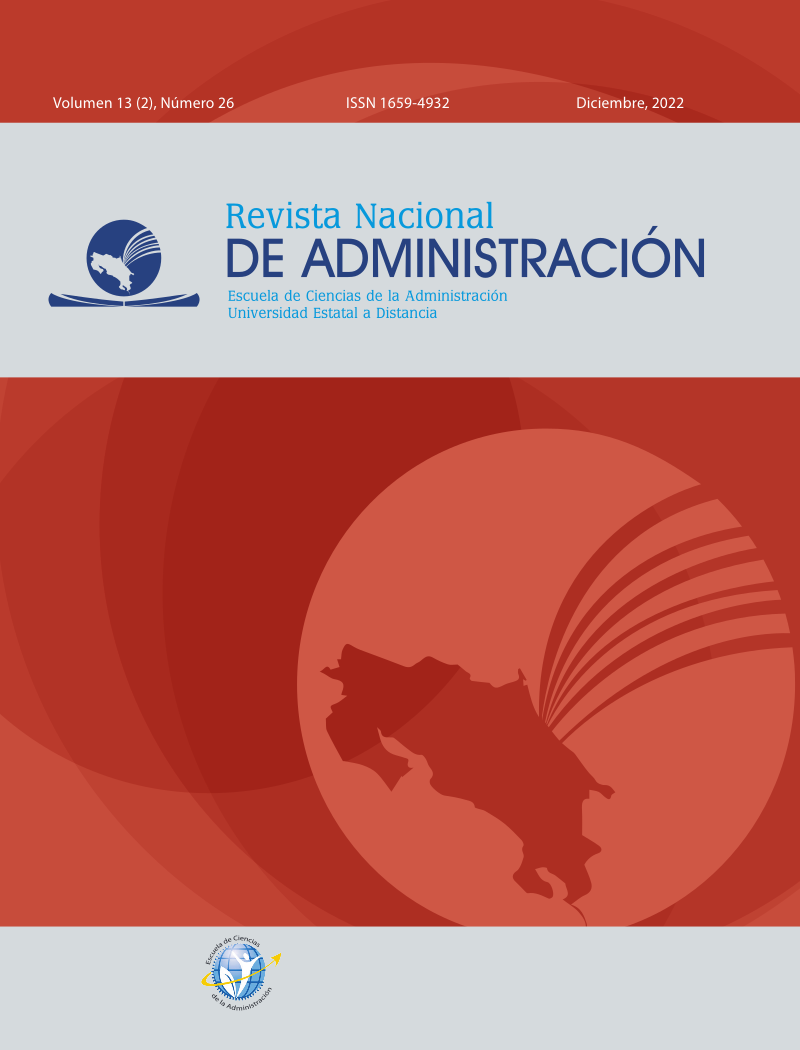Method for managing a project through digital media in the testing stage: PROMADE case
DOI:
https://doi.org/10.22458/rna.v13i2.3947Keywords:
Public administration, internal control, risk management, project management, textbook productionAbstract
The purpose of this work is to present, as a result of a qualitative study with an action-research design, a method for the management of a software development project in the testing stage, on a large scale, that involves the participation of different entities, through digital means, in order to manage risk in an agile way, as part of the internal control dictated by the public administration. The case of the testing stage of the SITRA-PROMADE system is presented, commissioned by the UNED to an external company to monitor the production process of written teaching materials. The application of the method contributed to the increase in the number of observations accepted by the company for the improvement of the system: it went from 44.75% of accepted observations to 78.68% of a total of 570.
References
Alhazmi, Alhejab y Shihong Huang. “A Decision Support System for Sprint Planning in Scrum Practice”. IEEExplore, 4 de octubre de 2018. https://ieeexplore.ieee.org/document/8479063
Badriyah, Tessy, Esti Nur Fadila, Iwan Syarif y N. H. Jauari. “Rapid Development of m-Health application with the Sprint Design approach and Scrum process: Application Development for e-Prescribing”. En 2018 International Conference on Applied Science and Technology (iCAST), 2018, 336-34. https://doi:10.1109/iCAST1.2018.8751603
Costa Rica. Ley General de Control Interno N.º 8292. 4 de setiembre de 2002.
Glinz, Martin. A Glossary of Requirements Engineering Terminology. Zurich: IREB, 2017. http://www.compliance-technologies.com/DS/ireb_cpre_glossary_17.pdf
Hillson, David. “Desarrollar una cultura de riesgo: ¿lo primero o lo último?”. Setiembre de 2011. https://risk-doctor.com/wp-content/uploads/2020/06/67S-Risk-culture-first-or-last.pdf
IEEE. “830-1998 - IEEE Recommended Practice for Software Requirements Specifications”. IEEExplore. 9 de diciembre de 2009. https://ieeexplore.ieee.org/document/720574
PROCI. “Programa de Control Interno. ¿Quiénes somos?”. Acceso el 10 de mayo de 2022. https://www.uned.ac.cr/viplan/proci
PROMADE. “Proceso de producción académica”. 2017.
PROMADE. “Plan de teletrabajo modelo para Promade”. 2019.
PROMADE. “Especificación de requerimientos. Sistema de trazabilidad del proceso de producción de materiales didácticos (SITRA)”. 2019.
PROMADE. “Reporte de Autoevaluación del SCI 2021 de PROMADE”. 2021.
PROMADE. “Oficio PROMADE 030-2021 Informe SITRA-PROMADE (02 de febrero de 2021 al 08 de marzo de 2021)”. 2021.
Redrován, Fabio, Nancy Magaly Loja, Kevin David Correa y Josías Israel Piña. “Estado del arte: métricas de calidad para el desarrollo de aplicaciones web”. 3C Tecnología: glosas de innovación aplicadas a la pyme, 6, n.° 4 (diciembre, 2017): 1-12. http://dx.doi.org/10.17993/3ctecno.2017.v6n4e24.1-12/
UNED. “Proceso de Producción”. 2016. https://www.uned.ac.cr/dpmd/promade/proceso-de-produccion
UNED. Acuerdo del Consejo Universitario CU-2564-2016. 1 de diciembre de 2016. https://www.uned.ac.cr/viplan/images/provagari/Acuerdo_2564_Aprobaci%C3%B3n_Reglamento_Control_Interno.pdf
UNED. Acuerdo del Consejo Universitario CU-2741-2019. 6 de junio de 2019. https://www.uned.ac.cr/conuniversitario/images/actas/2019/2741-2019.pdf
UNED. “EDU-UNED-150-SBCC-CF-2016-000001 Consultoría para Desarrollo de Sistema de Información para la Automatización de Servicio Académicos Institucionales-Selección basada en calidad y costo”. 2019.
UNED. “Programa de Producción de Material Didáctico Escrito (PROMADE)”. 2020. https://www.uned.ac.cr/dpmd/promade/quienes-somos/mision-y-vision
Downloads
Published
How to Cite
Issue
Section
License
Copyright (c) 2022 The National Administration Review

This work is licensed under a Creative Commons Attribution-NonCommercial-ShareAlike 4.0 International License.
Aquellos autores/as que tengan publicaciones con esta revista, aceptan los términos siguientes:
- Los autores/as conservarán sus derechos de autor y garantizarán a la revista el derecho de primera publicación de su obra, el cuál estará simultáneamente sujeto a la Licencia de reconocimiento de Creative Commons que permite a terceros compartir la obra siempre que se indique su autor y su primera publicación esta revista.
- Los autores/as podrán adoptar otros acuerdos de licencia no exclusiva de distribución de la versión de la obra publicada (p. ej.: depositarla en un archivo telemático institucional o publicarla en un volumen monográfico) siempre que se indique la publicación inicial en esta revista.
- Se permite y recomienda a los autores/as difundir su obra publicada en la revista a través de Internet (p. ej.: en archivos telemáticos institucionales o en su página web).

